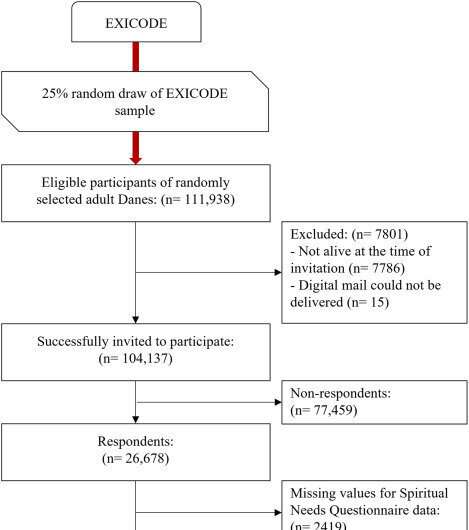by Marianne Lie Becker, University of Southern Denmark Faculty of Health Sciences
Do you ever think about what happens when we die, whether we have a soul, or what the meaning of life is? This—and much more—is what new research is shedding light on.
In 2021, more than 100,000 Danes were invited to participate in the largest questionnaire survey ever conducted on spiritual and existential needs.
They were asked 20 questions, all related to these topics. Over 80 percent of those who responded reported experiencing at least one strong or very strong spiritual need in the past month.
The first study based on the survey has just been published in The Lancet Regional Health—Europe.
“We live in a society where religion and spirituality are taboo and something we rarely talk about with each other. What we believe in, why we are here, what happens when we die. And we might be led to believe that it’s not important, or something we shouldn’t concern ourselves with in the healthcare system. But our study convincingly shows that these topics are important to Danes,” says Tobias Anker Stripp, a medical doctor and Ph.D. student who is the lead author of the study.

Intuitively important needs
In the study, participants were asked about their need for finding inner peace and doing something for others, with these two topics being the most highly valued.
“Experiencing inner peace and giving something of oneself to others are classic existential or spiritual needs. And even though we don’t always verbalize it that way, most of us intuitively feel that this is important. About one-fifth of Danes have also reported a religious need—that is, a need directly related to belief in something greater. All of this we have now shown in numbers.”
“When you think about how healthy it is to believe in something greater and experience meaning in life, I think it’s important that we as healthcare professionals are interested in whether our patients have needs in these areas that we can address, especially when dealing with serious illness. Biomedical treatment is not enough. We must remember that we humans are more than just our physical bodies,” says Stripp.
Jens Søndergaard, who is a professor in the Research Unit for General Practice and a practicing physician, agrees with this.
“This study supports the holistic approach that general practice sees as central and has been educating practicing physicians in for years. This approach should be disseminated and supported by the entire healthcare system.”
“It is also a shift in the right direction for medical research that a respected journal like The Lancet addresses this topic,” which is otherwise atypical, he believes.
How do we get better at communicating?
Professor Niels Christian Hvidt is the last author of the article and the one who initiated the study several years ago. He conducts research specifically on the care of existential and spiritual needs that the study uncovers. He views the feedback from practitioners as highly encouraging, since, “Danes do not talk much about their beliefs and personal values and have a low degree of religious practice. But as the study shows, we in Denmark have the same needs for inner peace, meaning, faith, and hope as seen in more religious countries.”
“Therefore, the study raises the question of how we can become better at talking about these needs, also in the healthcare system, especially when life gets tough, because it can have a direct impact on how we face life and the challenges it may bring us. ”
More information:
Tobias Anker Stripp et al, Spiritual needs in Denmark: a population-based cross-sectional survey linked to Danish national registers, The Lancet Regional Health—Europe (2023). DOI: 10.1016/j.lanepe.2023.100602
Provided by
University of Southern Denmark Faculty of Health Sciences
Citation:
New study aims to break the taboo surrounding spirituality (2023, March 13)
retrieved 13 March 2023
from https://medicalxpress.com/news/2023-03-aims-taboo-spirituality.html
This document is subject to copyright. Apart from any fair dealing for the purpose of private study or research, no
part may be reproduced without the written permission. The content is provided for information purposes only.


